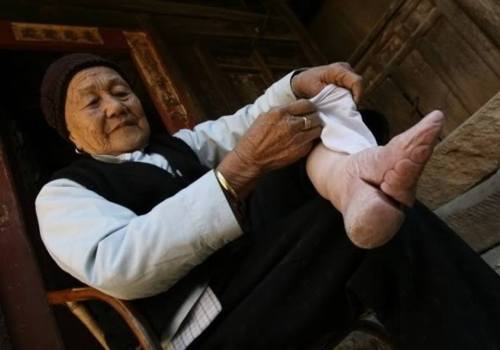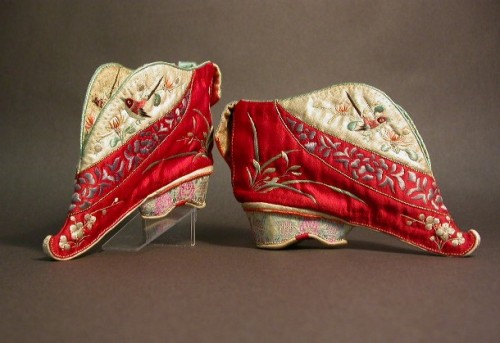#lotus feet
The Bizarre and Ancient Practice of Foot Binding in China,
One of the strangest forms of body modification, foot biding was an ancient Chinese practice dating to the 10th and 11th century. At a young age, girls feet were bound in tight wrappings to bend the bones of the foot. It wasn’t uncommon for the bones to be purposely broken as well. The wrappings could stay on for years, resulting in badly deformed feet called “Lotus Feet”. The disfigured Lotus Feet typically had a high bent arch while the metatarsal bones and toes were broken or disfigured in such a way that they came to a sharp point. In essence, the goal of foot binding was to transform the foot into the shape of a pointed toe high heel shoe. Needless to say the process was long and extremely painful for the girls and young women who were forced to undergo the tradition.
Foot binding was a practice always done to women, typically of the upper classes but also the lower class. It was common for upper class women as a status symbol, essentially communicated that the person with Lotus Feet was a women who need not work on her feet, or even walk as servants could attend to her every whim. It was also a symbol of attractiveness and even erotic sexuality. Many lower class Chinese families also bound the feet of their daughters. Women with bound feet were much more desirable for marriage than those who weren’t bound, and having Lotus Feet could give young women the opportunity to marry rich. Special shoes were made for women with Lotus Feet to accommodate the deformed feet.
While foot binding was a status symbol for many Chinese as well as a chance for better opportunities, the body modification was not without its price. Many women were permanently crippled by the practice. Other side effects included nerve damage, muscle damage, arthritis, blood circulation problems, osteoporosis, and a lifetime of chronic pain. The popularity of foot binding waned by the late 19th century. By the 20th century China was awash in anti-footing binding campaigns, as many saw the practice as cruel, elitist, and a symbol of the corruption and abuses of the Chinese Empire. In 1912 the practice was banned in China, though foot binding continued in secret up to the 1950’s and 60’s.
Post link




